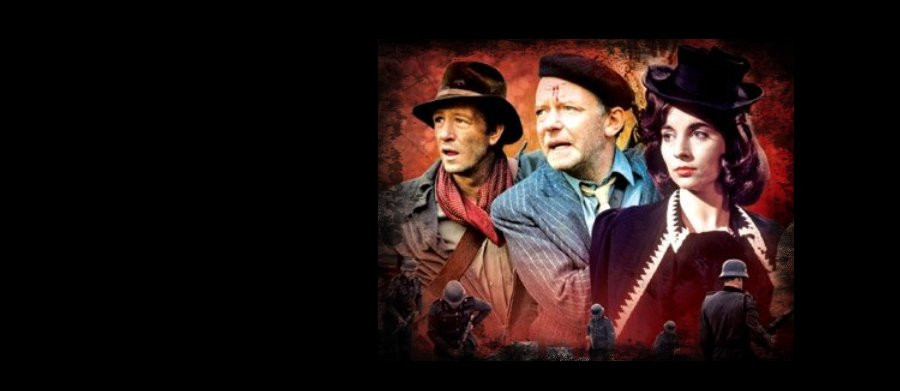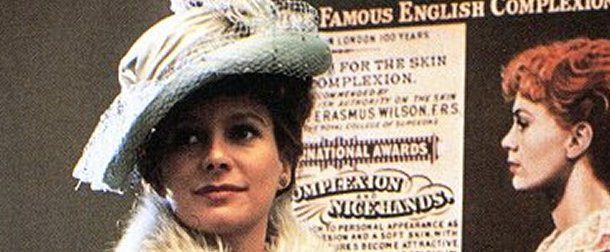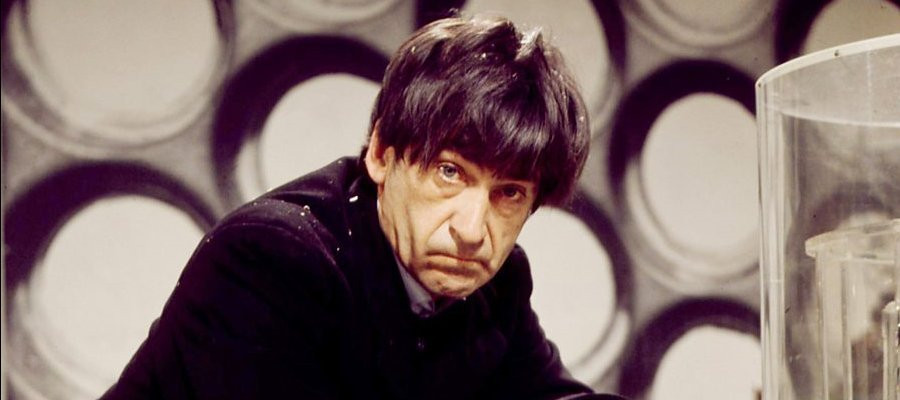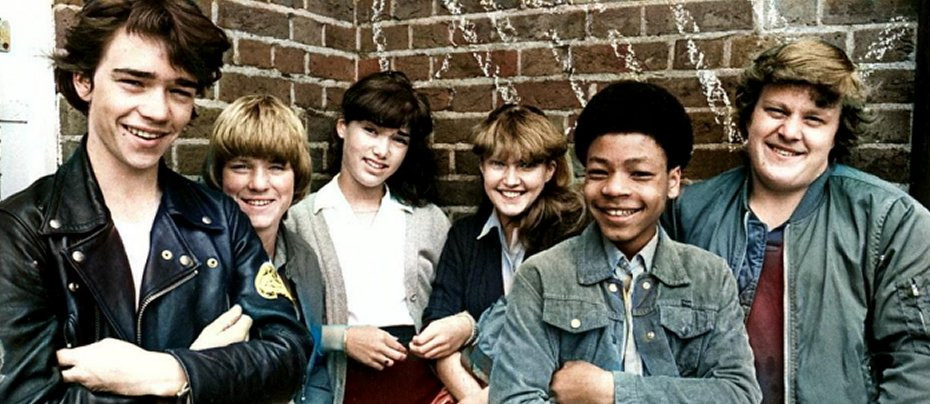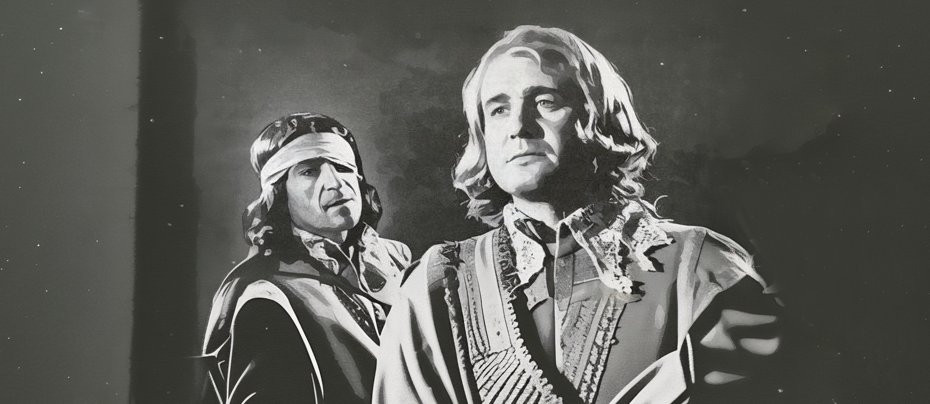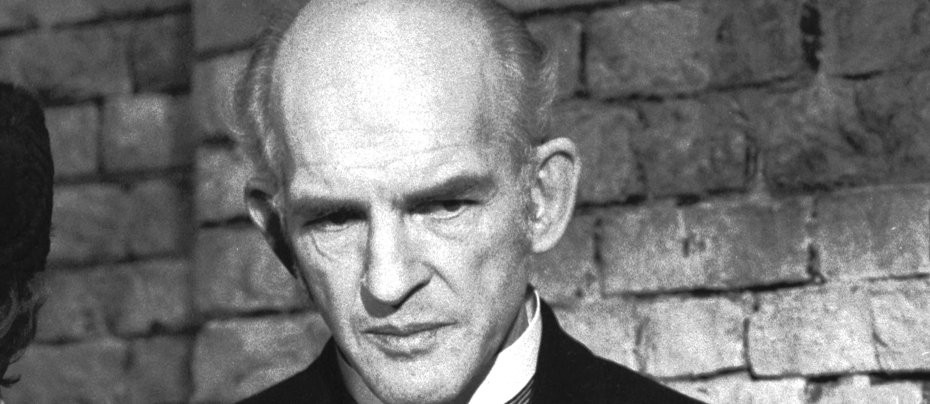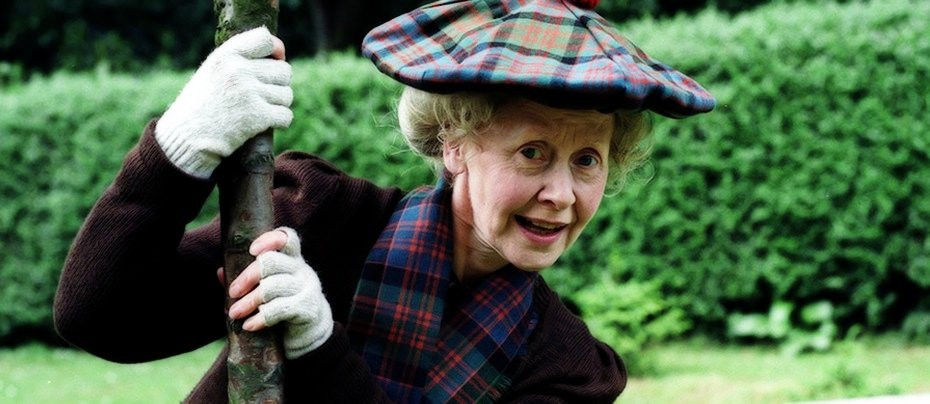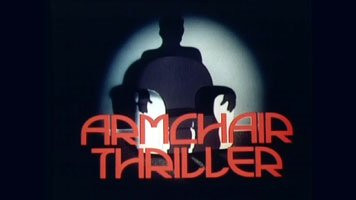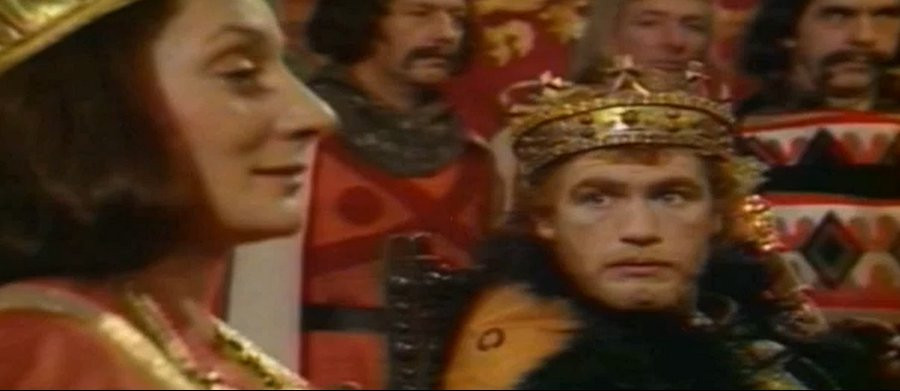
The Devil's Crown
1978 - United KingdomReview: John Winterson Richards
Towards the end of the 1970s, the BBC were he uncontested World Heavyweight Champions of Historical Drama. Building on the success of relatively straight retellings of history such as The Six Wives of Henry VIII, Elizabeth R, and Fall of Eagles, they reached a peak with the more sensationalist but dramatically brilliant I, Claudius in 1976.
The problem with peaks is that they are, by efinition, the beginnings of declines: once you are at the very top, there is nowhere to go but down. The likes of Prince Regent, The Borgias and The Cleopatras attempted to mimic the sensationalist style of I, Claudius but without ts critical success. Rewatching them at a distance, they have their good points and certainly did not deserve the unreservedly bad press the last two got at the time. Nevertheless, they were not I, Claudius, because nothing lse could be. It remains the gold standard to this day.
Following the perceived failure of The Borgias and The Cleopatras, the Beeb lost their appetite for serious historical Epic - in the sense of drama based directly on historical events as opposed to Historical Romance, which uses those events as background. One of the reasons for their failure was that the BBC were usually not epic in the other sense of investing heavily in production values, The Borgias being a discouraging exception. If they had shown the courage to follow up their establishment of dominance with serious money, it might have been another story. As it was, the BBC retreated from the genre and left it to the Americans.
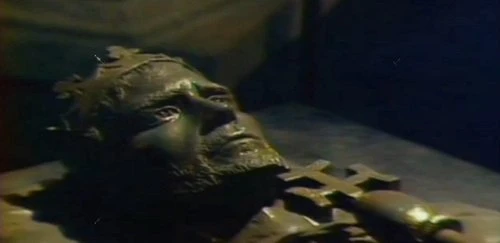
It is easy to see where The Devil's Crown fits into this pattern, between I, Claudius and Prince Regent in both chronology and quality.
It seems to have been a deliberate attempt to copy the I,Claudius formula for success: a basically accurate dramatisation of historical events, albeit with a sensationalist interpretation; a strong cast, even if some of the names were not yet well known; a literate script; and a close eye on the budget.
While not scaling the heights of I, Claudius, it works well on those terms. It is better drama than the Beeb's earlier historical dramas and better history than its later ones.
Its greatest strength is its concept, the true story of the early Plantagenet Kings of England, Henry II and his rebellious sons, the "Devil's Brood." It is a story so dramatic as to require little sensationalising. Indeed the facts are so astonishing that it is sometimes necessary to be sparing with them in case they seem too unlikely.
After all, the difference between history and fiction is that fiction has to look credible.
Its second greatest strength was its casting. The 1970s was a remarkable time for British acting. Directors could have their pick of the best of theatre trained veterans and a rising generation of future stars. The Devil's Crown definitely made the most of this, above all in the casting of the first three Plantagenet Kings.
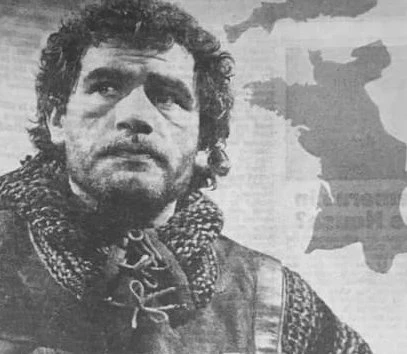
Henry II has been played by several great actors, but a young Brian Cox owned the role from the start. It was to a great extent his breakthrough, and even now it is extraordinary to watch, especially when one considers he must have been not long past his thirtieth birthday when filming began. He manages to capture the essence of Henry as history tells us he was at every stage of his life - the restless energy, the volcanic temper, the high intelligence mixed with low cunning, and the ability to charm at will. Even having enjoyed and admired Peter O'Toole as Henry in the feature film The Lion in Winter, and, even better, David McCallum in a fine stage production of the original play, it is impossible, once one has seen The Devil's Crown, to think of Henry without picturing Cox ranting at the King of France to stay out of his land, listing every bit of it. That is apparently exactly how it was.
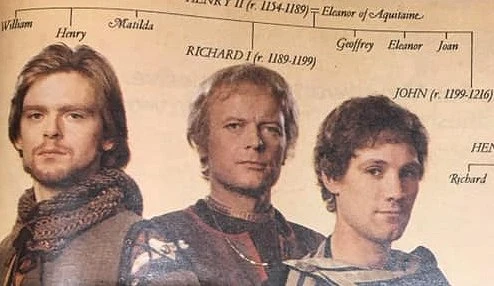
The accomplished Michael Byrne earns his money, as always, as Richard Coeur de Lion. It is not his fault that his is the least satisfying of the sketches of the three Kings. The cheap production means we never get to see the most important thing about Lionheart, that he was a truly outstanding military commander and individual fighter, who, during the Crusades, retook Jaffa by sheer personal aggression and then defied an entire Saracen army to attack him. Instead we get long scenes with him hanging out on a beach or boozing with his troubadour pal, Bertran de Born. Although played by the late, great Freddie Jones, who is always worth watching, de Born is presented here as a slightly seedy character, when the truth is that he was a respectable Baron who later became a Cistercian monk. Predictably the script also takes some of the more salacious gossip about Richard as fact when there is no solid evidence to support it.
Richard's inadequate brother John is played with surprising sympathy by John Duttine. The production happened to coincide with the end of a doomed attempt by some revisionist historians to give Bad King John at least a partial rehabilitation by blaming his brother for weakening the Kingdom. The historical consensus has now swung back against him, leaving Duttine's humanising performance as something of a curiosity of the time.
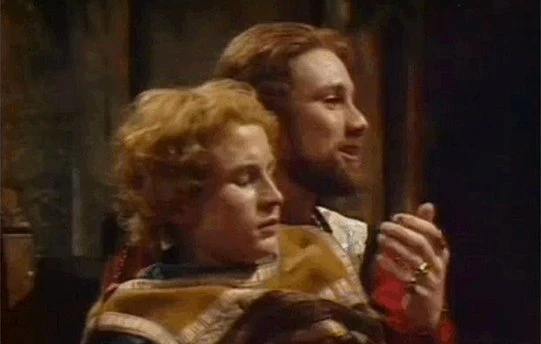
Duttine was very much a rising star at that point. Soon afterwards, he was to go on to great critical success in To Serve Them All My Days ...and then, inexplicably, very little. Once again, a star at the zenith can only decline. Whatever the reason in Duttine's case, it was not lack of talent. He shows John's crimes but also the vulnerability that lay beneath them. Here was a man trying to act tough because he felt intimidated by the memory of his father and elder brother. He invests his final scenes, in which a dying John is all too aware of political power ebbing away from him, with particular poignancy.
Another poignant scene worthy of mention has minor characters dwelling on their almost certain death in a forgotten battle in a forgotten Baronial rebellion, knowing that their feudal superiors are likely to survive. Soon after we do indeed see the rebellious Barons forgiven by Henry in a mood of extreme good humour following his victory. It is a powerful point well made.
The production boasts another of those great supporting casts of the 1970s, including Jane Lapotaire, Jack Shepherd, Charles Kay, Bruce Purchase, Zoe Wanamaker, Ian Hogg, Kevin McNally, Darien Angadi, and Patrick Troughton. The last plays the formidable William Marshal, Earl of Pembroke, the Plantagenets' most effective enforcer and the man who actually cleared up the mess left by John. It is a pity that more was not made of this.
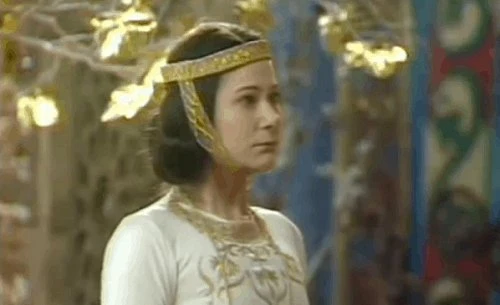
As with I, Claudius, the money spent on good casting seems to have been saved by skimping on other aspects of the production. The effects are, in general, "very 1970s BBC," and the overall impression is very stagey.
Indeed, even more than I, Claudius, it often seems like a theatrical production committed to film, and sometimes a studio theatre production at that. In an attempt to compensate, production design attempted to use a sort of medieval illuminated manuscript motif to link scenes. At its best, this has a positive visual impact but it decreases the sense of reality even more, and, at its worst, one finds oneself thinking fondly of the Frankie Howerd feature Up the Chastity Belt.
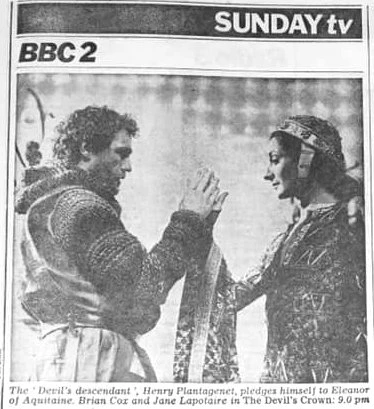
With the benefit of hindsight, The Devil's Crown was a missed opportunity. The BBC should have followed up the success of I,Claudius by investing more money in the one aspect in which I, Claudius had been deficient, its broader production values. Instead, they drew the opposite conclusion, that I, Claudius had proved that you can get away with production of historical dramas on the cheap.
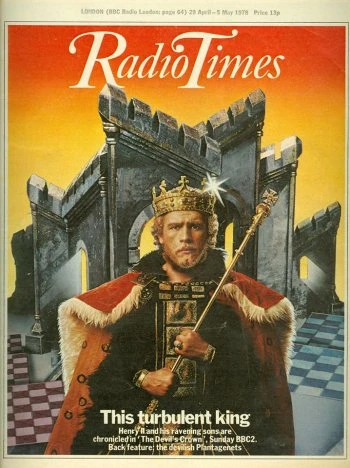
The opposite is true. While spectacle alone will not make up for any deficiencies of script or cast, audiences still expect it in historical Epic, even where there is a strong script and cast. A bit of location work never hurts either. ITV understood this, and so did Hollywood. While the BBC remained active in Historical Romance, to great effect in productions like the Pride and Prejudice with the damp Colin Firth, it surrendered historical Epic to the Americans and to international co-production.
It became the television equivalent of the jet engine - another product in which Britain once led the world only to surrender its advantage.
As for The Devil's Crown itself, the BBC seems to have erased it from its history. To its shame, it has never released it on DVD. There is apparently a French language version: the Plantagenets were, of course, also a major force in French history - and indeed considered themselves more French than English - and France seems to care more about its history than Britain does.
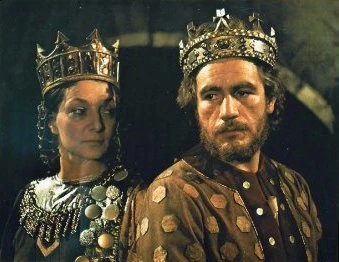
Seen this show? How do you rate it?
Seen this show? How do you rate it?
Published on February 10th, 2020. Written by John Winterson Richards. Radio Times pictures supplied by John Archbold (cover) and Peter Weeks for Television Heaven.


